#teresa guiccioli
Text
as a continuation to my unofficial series of posts i sometimes call "everyone in the literary scene (& all influential people in general) used to be related or know each other & it led to some really weird coincidences"
john polidori was a writer and the assistant of the famous byron who was in a long relationship with teresa gamba, who was married to the much older count guiccioli; & earlier, john polidori's father gaetano polidori had been a writer and the assistant of the famous alfieri, who had been friends with that same count guiccioli! many have written about the similarities between byron & alfieri — & knowing byron's love for symbolism etc., it's likely that polidori's father's service to alfieri was one of the things to inspire him to place john in his service.
and then through his sisters marriage, john polidori was the (posthumous) uncle of writer christina rossetti and writer/artist dante gabriel rossetti. john's father gaetano published the first works of his rossetti grandchildren as well as the works of his father agostino ansano polidori, who was a writer and a doctor like john.
#john polidori#gaetano polidori#count guiccioli#teresa gamba#teresa guiccioli#lord byron#alfieri#christina rossetti#dante gabriel rossetti#history#english literature#literature#romanticism#vittorio alfieri#agostino ansano polidori
37 notes
·
View notes
Text
help i’m hyperfixating on teresa guiccioli

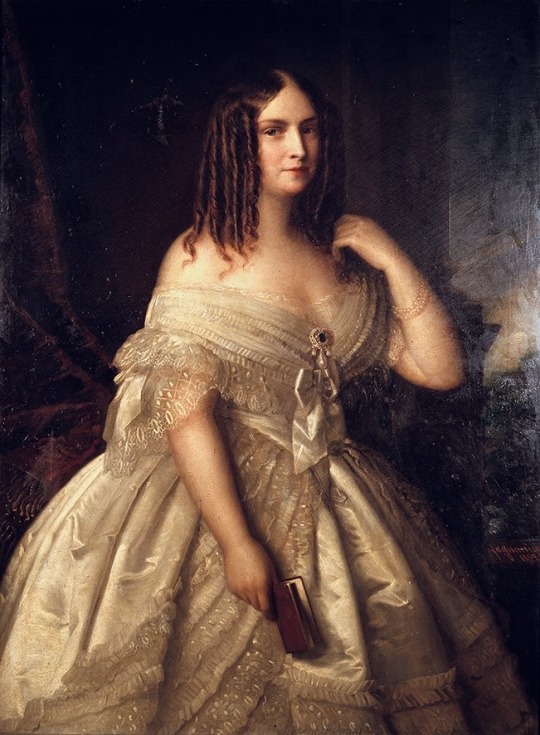


30 notes
·
View notes
Text
So apparently Countess G, a minor character that appears in the Count of Monte Cristo, is based on a real person, Teresa, Contessa Guiccioli. She is also known for being the mistress of Lord Byron.
Countess G actually namedrops Byron in the book!
#the count of monte cristo#alexandre dumas#countess g#teresa guiccioli#this book is mad it truly has everything#mypost
3 notes
·
View notes
Text
This week we
didn’t meet. I
hate that. The
bed is rumpled.
I go out onto
the lawn. The
stars are hid
in heavy haze.
The only moon
my lit room.
I put my hand
into the beam
that falls upon
a garden chair.
You’ve touched
that hand, and
it’s touched
you. I’ve little
to complain of.
In fact, I’m
not complaining.
I find it
on these hot
nights, hard to
fall asleep. If
you were here!
You almost were.
Then something
came up. Back
to bed. I’m reading
about Byron and
his last love,
la Guiccioli. I
identify with
her, afraid of
losing him. When
you’re down, I
get scared. What
if boredom should
set in? On your
side, not on mine.
I put my hand
on your side of
the bed. I see
you there as I
saw you sleep
there last week.
We’re not like
Byron and his
Teresa, we don’t
play games. (Byron,
by the way, was
great! So, in
her way, was
she.) At least,
the games we
play are sex
games, not the
kind that come
from ennui. God
damn this hot
and restless
night. I was
asleep and then
a dream that
you were angry
with me woke
me. I can’t
quite shake it
off. I know it
isn’t true. You’re
not. It’s hot:
I thought we’d
meet: we can’t:
I felt let down.
I get the downs
sometimes too. And
how. I trust you.
You’re as straight
as anyone I’ve
ever known. I hate
it when you’re
blue. You plunge
so deep into it. I
feel then I’m
in the dark and
can’t quite touch
you. Perhaps
I needn’t, shouldn’t
try. I respect
your inner life.
You have Irish
moods (and eyes).
I do too. I—
what is it that
I want to say? To
say this isn’t
a complaint. It’s
how I feel on
a hot night in
August, 1972,
missing you.
— James Schuyler, “August Night,” in Collected Poems
419 notes
·
View notes
Text
“And when [Thomas] Medwin finally left, on the twenty-eighth of August, Crawford found himself unable to talk to Byron at all. The lord spent all his time locked in his room reading, or lounging with Teresa Guiccioli in the main garden, and when Crawford had one day presumed to interrupt the two lovers, Byron had angrily told him that any further intrusions would result in his abandoning their plans altogether.”
2 notes
·
View notes
Quote
... you will recognize the hand-writing of him who passionately loved you - and you will divine that over a book which was yours - he could only think of love. In that word beautiful in all languages - but most of all in yours - Amor mio - is comprized my existence here and hereafter.
Lord Byron, Letter to Countess Teresa Guiccioli (August 23rd, 1819)
8 notes
·
View notes
Text
Another chapter where the old translation completely changes the chapter title: in the original French, it's "Apparition".
The email appears to have an orphaned footnote marker next to "This fresh allusion to Byron", so here are some things the footnote might have mentioned: The opera they're attending, Parisina, is based on a narrative poem of the same name by Byron. The Medora to whom Countess G—— compares the mysterious Greek lady is from another of Byron's narratives, "The Corsair". The countess herself is a fictionalised version of Teresa, Contessa Guiccioli, of whom it would not be overstating the case to say that she knew Lord Byron pretty well.
#the cristo account#the count of monte cristo#chapter 34#lost in translation#lord byron#not a reblog
5 notes
·
View notes
Text
A letter to to Teresa Guiccioli from Lord Byron
My dearest Teresa,
I have read this book in your garden;–my love, you were absent, or else I could not have read it. It is a favourite book of yours, and the writer was a friend of mine. You will not understand these English words, and others will not understand them,–which is the reason I have not scrawled them in Italian. But you will recognize the handwriting of him who passionately loved you, and you will divine that, over a book which was yours, he could only think of love.
In that word, beautiful in all languages, but most so in yours–Amor mio–is comprised my existence here and hereafter. I feel I exist here, and I feel I shall exist hereafter,–to what purpose you will decide; my destiny rests with you, and you are a woman, eighteen years of age, and two out of a convent. I love you, and you love me,–at least, you say so, and act as if you did so, which last is a great consolation in all events.
But I more than love you, and cannot cease to love you. Think of me, sometimes, when the Alps and ocean divide us, –but they never will, unless you wish it.
1 note
·
View note
Photo
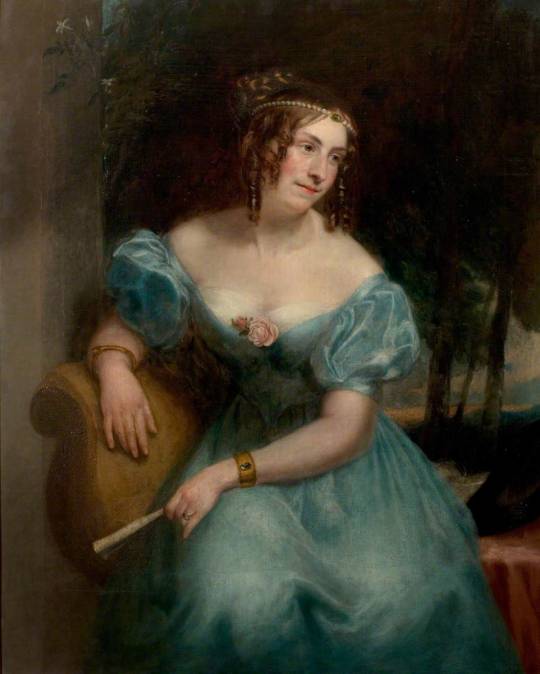
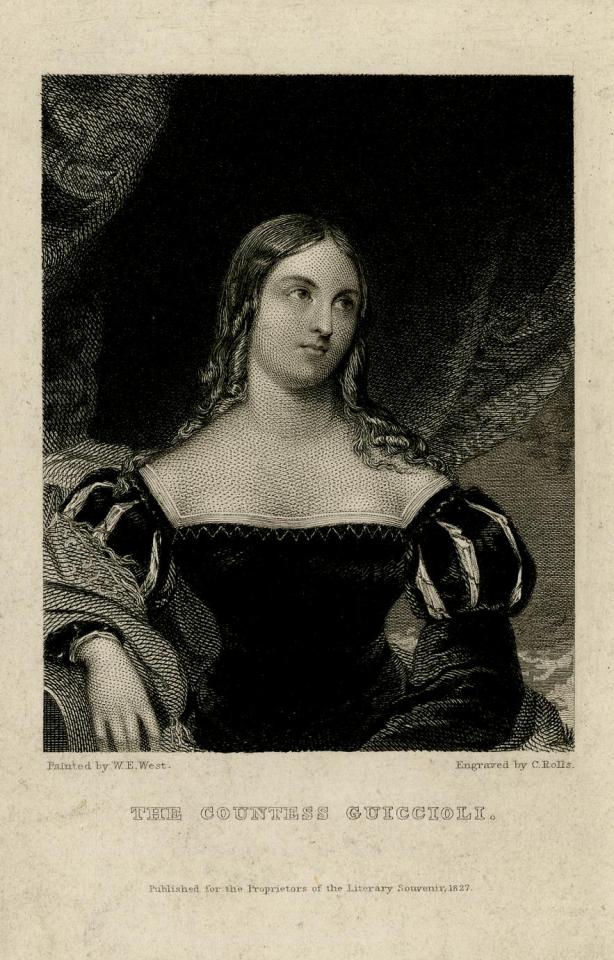
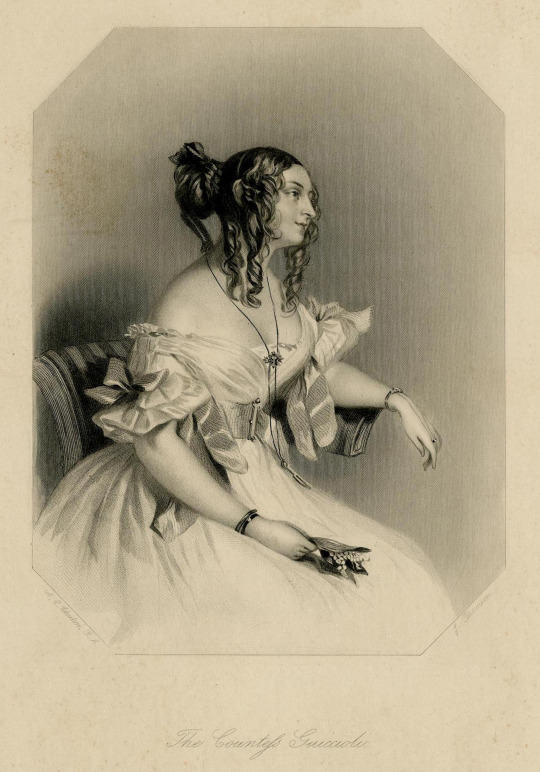
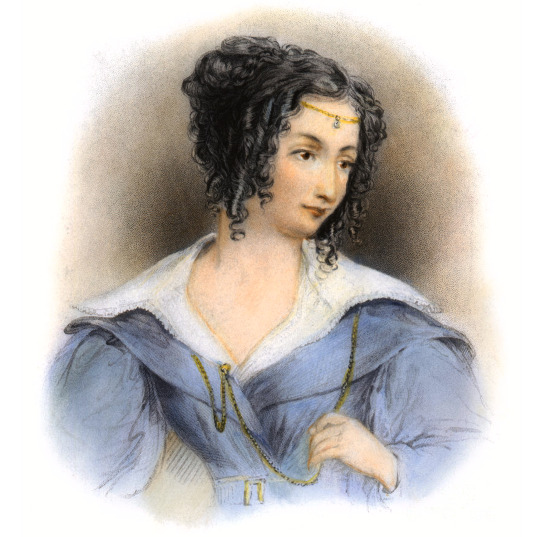
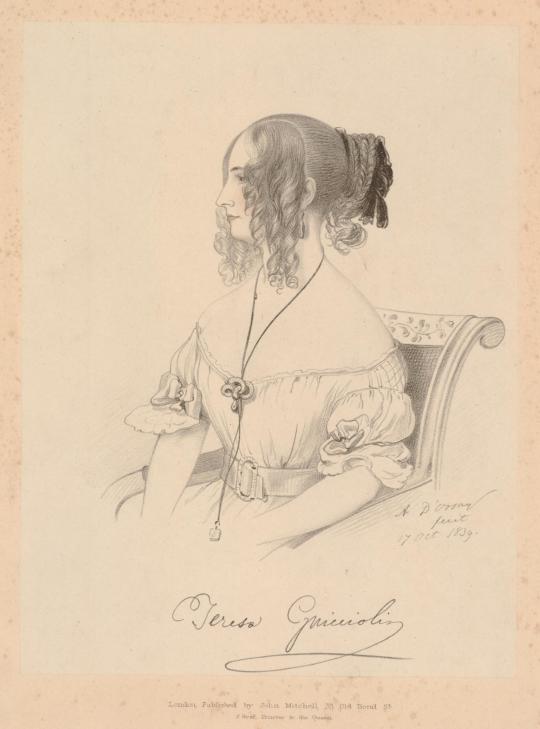
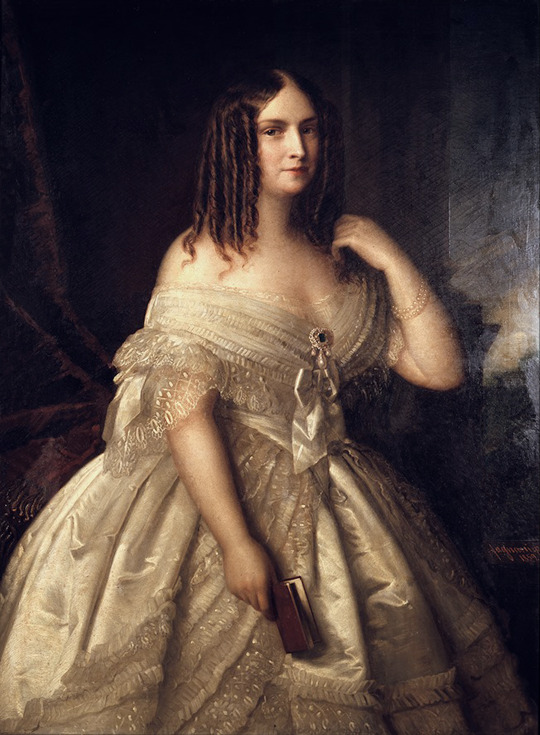
Countess Teresa Guiccioli - She was Byron’s mistress.
From top to bottom:
Countess Teresa Guiccioli by Henry William Pickersgill (Nottingham City Museums & Galleries - Nottingham, East Midlands UK). From artuk.org 962X1200 @72 227kj.
1827 Teresa, Countess Guiccioli, half-length, facing front, wearing a dress, with a curtain behind after William Edward West (British Museum). From their Web site 883X1380 @300 490kj.
1834 Coutness Guiccioli by James Thompson after Alfred Edward Chalon (British Museum). From their Web site; removed one flaw in background with Photoshop 2374X3394 @72 2.6Mj.
1833 Countess Teresa Guiccioli by ? probably after William Brockedon (location ?). From fineartamerica.com/featured/3-countess-teresa-guiccioli-granger.htmi; removed print 2110X2098 @144 4.9Mp.
1839 Countess Guiccioli by Richard James Lane after Count Alfred Guillaume Gabriel d'Orsay (British Museum). From their Web site1851X2500 @300 662kj.
1859 Teresa Guiccioli by Giuseppe Fagnani (Keats-Shelley Memorial House - Roma, Italy ?). From facebook.com/keatsshelleyhouse/photos/todayinletters-byron200in-1820-two-hundred-years-ago-to-this-day-lord-byron-wrot/10158332037563048/; removed spots. with Photoshop 2115X2880 @144 6.9Mp.
#Teresa Guiccioli#1820s#1827#1830s#1833#1834#1839#1850s#1859#British Regency#early Victorian#straight hair#side curl coiffure#ferroniere#chemise#bateau neckline#V neckline#off-shoulder neckline#off-shoulder V neckline#chignon#paned sleeves#French sleeves#quarter length full sleeves#bow#floral bodice ornament#bracelets#lapels#belt#pleated and lace bertha#quarter length close sleeves
7 notes
·
View notes
Text
"The current I behold will sweep beneath
Her native walls and murmur at her feet;
Her eyes will look on thee, when she shall breathe
The twilight air, unharmed by summer's heat.
She will look on thee, -I have looked on thee,
Full of that thought; and, from that moment, ne'er
Thy waters could I dream of, name, or see,
Without the inseparable sigh for her!
Her bright eyes will be imaged in thy stream, -
Yes! they will meet the wave I gaze on now:
Mine cannot witness, even in a dream,
That happy wave repass me in its flow!"
- Lord Byron, Stanzas to the Po
I think this is one of the most tender compositions Byron wrote to a woman. Certainly he was really in love with Teresa in the early times of their relationship, and this is the prove: Byron was unable to write something fictitious; his need to write was caused by his thoughts and emotions - furthermore, he hated fictions.
#lord byron#stranzas to the po#romantic poetry#english poetry#poetry#english romanticism#romanticismo#romanticism#teresa guiccioli
3 notes
·
View notes
Text
i know ada lovelace and mary shelley never met but in my mind they did and mary would’ve been like her cool aunt 🥺 and so would teresa guiccioli 🥺 if they had all grown old together ada would have spent summers with them in italy 🥺
#its nearly 4am#oddly enough#ada hated augusta who openly ignored her#lmao?#augusta and anna had such a weird dynamic#aside from the obvious reasons#bc they did like each other but it seems they had an on and off friendship idrfk#umm ada never met percy/mary’s son either#ada did meet hobhouse and disliked him at first but they warmed up to each other#which is surprising but nice#ada lovelace#mary shelley#teresa guiccioli#the romantics#romanticism#lord byron
40 notes
·
View notes
Text
Fragmento de una de las cartas de amor que escribió Lord Byron a Teresa Guiccioli.
Bologna, 25 de agosto de 1819
Mi queridísima Teresa, He leído este libro en tu jardín; mi amor, tú estabas ausente, de lo contrario no lo hubiera leído.
Este libro es uno de tus favoritos, y el escritor fue amigo mío. Tú no entenderás estas palabras en inglés, y otros no las entenderán, que es la razón por las que no las garabateé en italiano. Pero tu reconocerás la letra de quien te ama apasionadamente, y lo adivinarás. En un libro que fue tuyo, el sólo puede pensar en amor.
En esa palabra, bella en todos los idiomas, pero aún más en el tuyo Amor mío, está incluída mi existencia ahora y de aquí en más. Siento que existo ahora, y que existiré, para el propósito que decidas, mi destino reposa contigo y tú eres una mujer [...]
1 note
·
View note
Text
Ravenna ~ Marguerite Yourcenar
Ravenna ~ Marguerite Yourcenar
Ho letto ieri per la prima volta il romanzo di Huysmans Controcorrente, e l’ho letto qui, a Ravenna. In questa città, questo libro discutibile si sottrae alla moda per diventare Storia. Des Esseintes a Ravenna non è mai venuto, che importa? Tra i suoi esercizi spirituali i viaggi non erano contemplati. Il personaggio, confortevolmente imbacuccato in abiti di broccato, avrebbe potuto…

View On WordPress
2 notes
·
View notes
Note
Hey, I have a request thought I'm not sure if you've done it before: love told through letters <3

Richard Steele to his second wife Mary Scurlock in the weeks preceding their wedding (c. August 1707)

Wilfred Owen to Siegfried Sassoon (5th November 1917)

Simone de Beauvoir to her husband Nelson Algren (18th May 1947)

Orson Welles to Rita Hayworth (c. 1943)
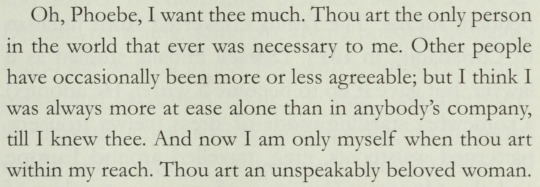
Nathaniel Hawthorne to his wife Sophia Peabody

Ludwig van Beethoven, in a letter to his ‘Immortal Beloved’
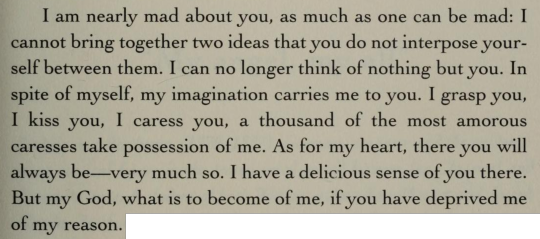
Honoré de Balzac to Countess Ewelina Hańska (c. June 1835)

Amal El-Mohtar & Max Gladstone, This Is How You Lose The Time War

Lord Byron to Teresa, Contessa Guiccioli (25th August 1819)

Zelda Fitzgerald to her husband, F. Scott Fitzgerald (c. 1920)
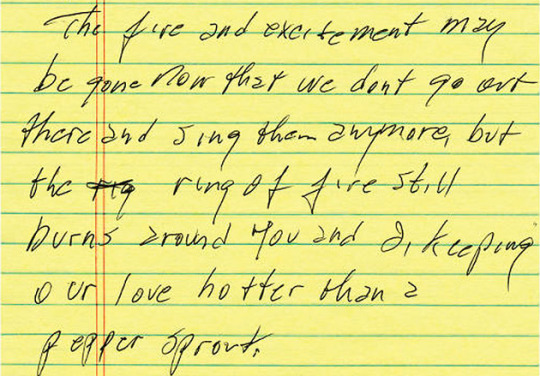
Johnny Cash, in a letter to his wife June

Henry VIII of England to his then-mistress and later second wife Anne Boleyn; contemporary spelling and interpretation by me

Katherine Mansfield to John Middleton Murry (19th May 1917)

Oscar Wilde to Lord Alfred Douglas (20th May 1895)
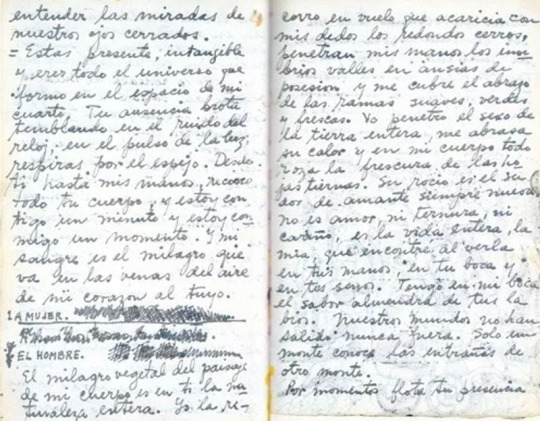
One of Frida Kahlo’s letters to Diego Rivera; first published in The Diary of Frida Kahlo: An Intimate Self-Portrait

Alex Turner to Alexa Chung (c. 2007)

John Keats to Fanny Brawne (c. 1820)

Vladimir Nabokov to his wife, Véra; from Letters to Véra (c. 1924)

Lemony Snicket, Letters to Beatrice; ‘A Love Letter to End All Love Letters’
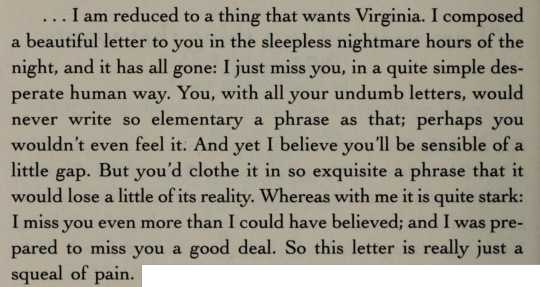
Vita Sackville-West to Virginia Woolf (21st January 1926)

Laurence Sterne to Catherine Fourmantel (8th Mary 1760)

Charlie Parker to his common-law wife Chan Woods

Virginia Woolf to Vita Sackville-West (c. 1927)

Denis Diderot to Sophie Volland (20th October 1759)
#i've done friendship in letters but not romantic love!! so here we go#webs#web weaving#theme: love#theme: the written word#requests#mine#wilfred owen#simone de beauvoir#orson welles#nathaniel hawthorne#ludwig van beethoven#honore de balzac#amal el-mohtar#max gladstone#lord byron#zelda fitzgerald#johnny cash#henry viii#katherine mansfield#oscar wilde#frida kahlo#alex turner#john keats#vladimir nabokov#lemony snicket#daniel handler#vita sackville west#virginia woolf#denis diderot
2K notes
·
View notes
Text
Think of me, sometimes, when the Alps and the ocean divide us, — but they never will, unless you wish it.
— Lord Byron, "Letter To The Countess Teresa Guiccioli"
#lord byron#aesthetic#dark academia#light academia#literature#quotes#poetry#books#letters#lord george gordon byron#percy shelley#romanticism#love quotes#john keats
151 notes
·
View notes
Text
Lord Byron
Truth is always strange,” George Gordon Noel Byron once wrote. “Stranger than fiction.” In one line of verse he gave us both a truism still heard today and the perfect tagline for his brief, scandalous, hedonistic life.
When you’re the son of a guy known as “Mad Jack,” chances are you’re in for a wild ride. Little George didn’t get to know his father very well, for dear old dad drank himself to death when the boy was only three. But Mad Jack’s legacy of excess seeped into his offspring’s consciousness, if not his genes. In any case, Byron had little choice but to be his father’s son, since his mother hated him. She called him her “lame little brat,” on account of his clubfoot, and once tried to beat him to death with a set of fire tongs. Even worse, Byron’s governess, May Gray, reportedly molested him at the age of nine. About the only good thing to happen in his childhood was that he inherited his uncle’s wealth along with his title: Baron Byron of Rochedale. From then on, George Gordon was known as Lord Byron.
He grew into a strikingly handsome man. Other than his lame foot, for which he compensated through displays of athletic prowess, Byron’s only imperfection was a tendency to put on weight. In typical nineteenth-century fashion, he overcame this predisposition by starving himself and taking copious quantities of laxatives. Sex would prove to be his real nourishment, anyway. Byron was the Wilt Chamberlain of his day, reportedly bedding 250 women in Venice in one year alone. His long list of lovers included Lady Caroline Lamb (who famously described him as “mad, bad, and dangerous to know”), her cousin Anne Isabella Milbanke (who became Lady Byron in 1815), and, reportedly, his own half sister, Augusta Leigh. Nor did he restrict himself to one gender. Byron had numerous homosexual affairs, often with underage boys. Other than the exotic animals he kept for companionship, there didn’t seem to be too many creatures he wasn’t interested in having sex with.
As a consequence, Byron became Europe’s most celebrated rake. His poetic achievements never garnered as much attention as did the wild rumors that sprang up about him. Oddly enough, a lot of the gossip involved Byron drinking wine out of someone’s skull. (Sometimes it was a dead monk’s, sometimes an old mistress’s.... The legends tended to outrace reality.) Fed up with the philandering, Lady Byron gave her husband his walking papers in 1816—just one year into their marriage. He then left England for the Continent and never returned. It was the only way to avoid public censure by British society.
Byron spent that summer in Switzerland with his personal physician, John Polidori. They struck up a friendship with poet Percy Bysshe Shelley and his fiancée, Mary Godwin. During a stretch of rainy weather, the group entertained themselves by writing monster stories. Mary produced an early version of what would become her novel Frankenstein, while Polidori used Byron as the inspiration for “The Vampyre.” The story of a suave British nobleman who sucks the blood out of unsuspecting victims, it would prove to be major influence on Bram Stoker’s Dracula.
From Switzerland, Byron traveled to Italy, where he had an affair with the very married Countess Teresa Guiccioli. He remained there until 1823, when he left for Greece and a rendezvous with destiny, helping the Greek independence movement repel the Ottoman Turks. Despite a complete lack of military experience, Byron helped drill troops and provided needed cash to the rebel forces. To this day, he is still considered a Greek national hero.
Before he could see any action, Byron was felled by an attack of malarial fever and died on Easter Sunday 1824. Soon after his death, which was mourned throughout England, a group of his friends gathered in London to read over his memoirs. The manuscript was filled with vivid descriptions of Byron’s sexual escapades, which, the group felt, might just destroy his hard-won “heroic” reputation. Determined that the memoirs never see the light of day, they proceeded to set them on fire.
2 notes
·
View notes